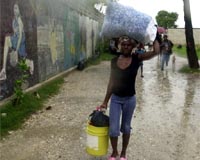| . |  |
. |
Port-Au-Prince (AFP) Feb 12, 2010 They drink French water, buy Camembert from Normandy and fine olive oil from Italy, but Haiti's rich are among the lucky few to have escaped unscathed from the killer earthquake a month ago. In upscale Petionville, in the foothills of Port-au-Prince, several markets run by Syrians are stocked with an inventory of products that far surpasses the basic needs that are still largely unmet for many in this impoverished country. Some of the customers' whims, like products and recipes to lose weight, seem like a slap in the face for a society where famine remains widespread. "Selling food you can never go wrong. People are always buying things to eat," said Moussa Aballa Nahra, the 70-year-old owner of Royal Market. The storefront looks deceptively simple, but step inside and fragrant, exquisite delicacies meet the eye everywhere: European chocolates, Portuguese olives, Chilean wines. All carry pricetags equivalent, and sometimes even higher, than in the United States. Nahra arrived in Haiti in 1961 and has never looked back. "This country was a paradise, very pleasant and very prosperous, with lots of hope for the future," he said in French alongside his wife, also from Tartus in northwestern Syria. "Nothing's missing here. I don't have security problems and business is good." The couple expressed pride that their three children -- a son and two daughters -- were Haitians. The Nahras may be one of the few Syrian families whose son married a Haitian woman. These families of traders and hotel and land owners are among the richest five percent of the nearly nine million people who live in Haiti, an upper class that has hardly felt the impact of the January 12 earthquake from their homes perched on pine hills overlooking the Caribbean Sea. "I live here only for business," said Joseph Hanna, 28, who speaks more Spanish than French because he lived in Venezuela before coming to Haiti three years ago. "This is a quiet place, people here are very good," he said at Olympia Market, where he even sells food and accessories for dogs and other pets, symbols of prosperity in a nation that has been wracked for centuries by natural disasters, political upheaval and crippling poverty. Haiti's upper crust also includes Haitians of mixed race, or mulattos, whose grandparents included not only natives to the Caribbean nation but also foreigners, including the Polish Jewish and Lebanese family of Alicia Bigio, owner of the Villa Creole hotel, which nearly collapsed in the quake. "We will take the time to think about what we will do" after closing the hotel on February 21, Bigio said. "But we are not losing hope because we can start anew thanks to government credits." She traveled to Port-au-Prince after the tremor and her eyes filled with tears as she recalled the scenes of utter chaos and destruction following the disaster that killed some 217,000 people and left 1.2 million homeless. "When I was young, in the 1960s and earlier, when our father was a doctor and our mother started the hotel, we had universities in Haiti with good professors," Bigio said. Her hotel today hosts much of the international press covering the aftermath of the tremor, as well as her employees, who are living in tents in the gardens. Wealthy and highly educated Haitians tend to live in the hills, have their children studying abroad and were able to leave the country quickly via private flights or land routes to neighboring Dominican Republic, which shares the island of Hispaniola with Haiti. "Luckily, my two children are studying in Bordeaux," said Patricia Steed Attie, the Haitian owner of Papaya. In the restaurant-lounge, her European customers, martini in hand and electropop music playing in the background, try to forget the crowds of desperate people fighting for their lives among roofless rubble just a few miles (kilometers) away. "I closed shop for nearly three weeks, but I decided to reopen," said Attie, whose home was destroyed in the temblor, along with the college run by her French husband in the center of the capital. "I think it's a way to keep from losing hope. My employees have started working again. It's a way to help and not give up."
Share This Article With Planet Earth
Related Links Bringing Order To A World Of Disasters A world of storm and tempest When the Earth Quakes
 Rains add new misery to quake-hit Haiti
Rains add new misery to quake-hit HaitiPort-Au-Prince (AFP) Feb 11, 2010 The first heavy rains since a devastating earthquake four weeks ago brought new misery to Haitians Thursday with hundreds of thousands of people still living in flimsy homemade shelters. The downpour a day ahead of the one-month anniversary of the quake served as a warning of the coming rainy season and the need to provide adequate shelter for an estimated 1.2 million still sleeping in the s ... read more |
|
| The content herein, unless otherwise known to be public domain, are Copyright 1995-2010 - SpaceDaily. AFP and UPI Wire Stories are copyright Agence France-Presse and United Press International. ESA Portal Reports are copyright European Space Agency. All NASA sourced material is public domain. Additional copyrights may apply in whole or part to other bona fide parties. Advertising does not imply endorsement,agreement or approval of any opinions, statements or information provided by SpaceDaily on any Web page published or hosted by SpaceDaily. Privacy Statement |